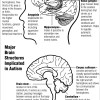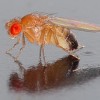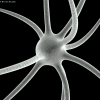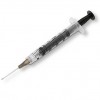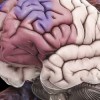Autism and Gut Bacteria?
 Here at the DNALC, we work with a lot of bacteria. One bacteria in particular is a harmless strain of E. coli called MM294. This strain, a strain unable to survive outside of its broth and agar domain, is used commonly in our classrooms. As students visit us each year, many have the opportunity to work with the bacteria. Whenever I tell my students that they will be working with E. coli, I tend to be on the receiving end of much criticism.
Here at the DNALC, we work with a lot of bacteria. One bacteria in particular is a harmless strain of E. coli called MM294. This strain, a strain unable to survive outside of its broth and agar domain, is used commonly in our classrooms. As students visit us each year, many have the opportunity to work with the bacteria. Whenever I tell my students that they will be working with E. coli, I tend to be on the receiving end of much criticism.
E. coli gets a bad reputation and I understand that. My students immediately cringe and I know what goes through their minds. They think of the E. coli outbreaks we’ve had in our foods as of late such as the ones that are leading to cases of severe food poisoning and death. I can quickly reassure them that this bacteria does not have this capability. In fact, many are surprised to learn that not all bacteria can cause harm. With the bad also comes the good and there are good bacteria as well.
Bacteria have taken up residence everywhere on and in you. Hundreds of species of bacteria live on your skin, live in your mouth, and in your intestines. Everyone is born sterile (completely clear of bacteria), but soon after birth bacteria moves in and multiplies enough to include more bacteria cells than human cells in your body.
Don’t get too grossed out! These bacteria strains are important. For example, Biologist Jeffrey Gordon of Washington University has a group of mice that are completely gut bacteria free. These mice are very different from their non-sterile cousins in the way that they are extremely skinny. Food passes right through their intestines, mainly undigested. Thus it is shown that the gut bacteria are more efficient at digesting our food than we are alone.
Today, the bacteria in our guts seem to do more things than originally thought. They are currently under investigation in studies of Autism. There is a hypothesis that these gut bacteria might be releasing chemicals that are contributing to the onset of Autism. Autism has already been linked to gastrointestinal problems. These gastrointestinal problems also seem to appear around the same time as behavior symptoms, so perhaps these gastrointestinal microbes have something to do with it.
Researchers in the UK are studying chemicals in the urine of people with Autism compared to those without the condition to detect any chemical differences. These metabolic changes might be detected in the urine. Using nuclear magnetic resonance (NMR) spectroscopy, the urine was analyzed. The results showed a clear difference between the two groups.
There is a theory that these gut bacteria are producing a toxin that might interact and disrupt brain development. One compound that was identified using the NMR spectroscopy was N-methyl-nicotinamide (NMND) which has already been linked to Parkinson’s disease.
At the University of Western Ontario in Canada, Derrick MacFabe and his colleagues have discovered that clostridium bacteria produce a short-chain fatty acid that many cause autism-like behavioral and biochemical changes in rats that can be reversed.
With this possible link, there might be a simple urine test for Autism. This test, done early enough, might then lead to earlier therapy and treatment options.
| Print article | This entry was posted by admin on June 25, 2010 at 11:31 am, and is filed under G2C Online. Follow any responses to this post through RSS 2.0. You can skip to the end and leave a response. Pinging is currently not allowed. |

